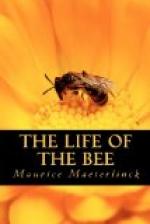[81]
Does this force take measures to maintain what may be struggling on its surface, or must we say, arguing in the strangest of circles, that what floats on its surface must guard itself against the genius that has given it life? That question must be left open. We have no means of ascertaining whether it be notwithstanding the efforts of the superior will, or independently of these, or lastly because of these, that a species has been able to survive.
All we can say is that such a species exists, and that, on this point, therefore, nature would seem to be right. But who shall tell us how many others that we have not known have fallen victim to her restless and forgetful intellect? Beyond this, we can recognise only the surprising and occasionally hostile forms that the extraordinary fluid we call life assumes, in utter unconsciousness sometimes, at others with a kind of consciousness: the fluid which animates us equally with all the rest, which produces the very thoughts that judge it, and the feeble voice that attempts to tell its story.
VI
THE NUPTIAL FLIGHT
We will now consider the manner in which the impregnation of the queen-bee comes to pass. Here again nature has taken extraordinary measures to favour the union of males with females of a different stock; a strange law, whereto nothing would seem to compel her; a caprice, or initial inadvertence, perhaps, whose reparation calls for the most marvellous forces her activity knows.
If she had devoted half the genius she lavishes on crossed fertilisation and other arbitrary desires to making life more certain, to alleviating pain, to softening death and warding off horrible accidents, the universe would probably have presented an enigma less incomprehensible, less pitiable, than the one we are striving to solve. But our consciousness, and the interest we take in existence, must grapple, not with what might have been, but with what is.
Around the virgin queen, and dwelling with her in the hive, are hundreds of exuberant males, forever drunk on honey; the sole reason for their existence being one act of love. But, notwithstanding the incessant contact of two desires that elsewhere invariably triumph over every obstacle, the union never takes place in the hive, nor has it been possible to bring about the impregnation of a captive queen.*
Professor McLain has recently succeeded in causing a few queens to be artificially impregnated; but this has been the result of a veritable surgical operation, of the most delicate and complicated nature. Moreover, the fertility of the queens was restricted and ephemeral.




